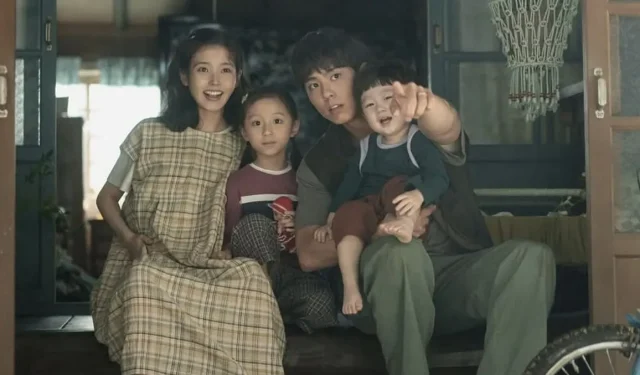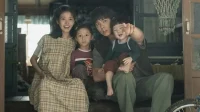The Groundbreaking Conclusion of *When Life Gives You Tangerines*
On March 28, Netflix’s *When Life Gives You Tangerines* reached its highly anticipated conclusion. In a remarkable twist, this series has emerged as the first K-drama to feature an original song by The Beatles. The narrative intricately weaves through more than sixty years of societal evolution, deftly capturing the lives of Ae-soon (portrayed by IU and Moon So-ri) and Gwan-sik (played by Park Bo-gum and Park Hae-joon), transitioning from the 1950s in Jeju to modern-day Seoul in 2025.
Nostalgic Melodies That Set the Tone
The drama commenced with the iconic Beatles track “Yesterday,”strategically selected to evoke a poignant and nostalgic atmosphere right from the first episode. This decision resonated deeply with viewers who were familiar with the song’s rich history.
One striking scene portrays an older Ae-soon immersed in her creativity, drawing with crayons as “Yesterday”softly underscores her reflections on turning 70. Her narration adds emotional depth, shedding light on the inexorable passage of time.
Behind the Scenes: Navigating Copyright Challenges
According to an April 7 report by Max Movie, music director Park Sung-il shared insights into the complexities of incorporating such a well-known song. While selecting the track seemed straightforward, navigating the intricate web of international copyright laws proved to be a formidable challenge. Park noted that The Beatles have one of the most convoluted licensing processes in the music industry.
For the track to be approved, thorough details were required regarding the scene’s context, how the song would be utilized, and the duration of its playtime. Although the fee for the song’s usage was not disclosed, Park remarked that ample time and financial resources were paramount for the production team to secure the necessary permissions. He stated:
“For that reason, I believe our work is the first to use an original Beatles song in a Korean drama.”
Viewer Reactions: A Wave of Enthusiasm
As news of *When Life Gives You Tangerines* featuring a Beatles song broke, fans took to X to express their excitement. Comments ranged from disbelief to utter joy, with one user remarking:
“This is honestly crazy.”
“It was worth it. Cause wdym the first seconds I watch wlgyt, I will hear ‘Yesterday’ playing? Immediately sold,”said a fan.
“Every department of this drama didn’t compromise on anything. What a team!”remarked another.
Many fans hailed the decision to include “Yesterday”in the very first episode, celebrating its immediate emotional impact.
“Playing ‘Yesterday’ in the first scene of the drama was insane; they want tears from me right away. Kudos!”one X user responded.
“Hearing ‘Yesterday’ at the opening scene set the nostalgic mood of the drama right away,”wrote another fan.
“I love that song so much. The way I was hyped and feeling emotional at the same time, lmao,”commented a netizen.
Insights from Music Director Park Sung-il
Discussing his initial impressions of the script, Park Sung-il described it as reminiscent of “a very well-written novel,”according to a Joy News 24 report from April 8. He highlighted the meticulous descriptions of character emotions, clothing, and gestures, which effectively guided his musical compositions.
“The emotions of the characters, their expressions, clothing, and even their gestures were described in great detail for each scene,”he stated. “In particular, the expressions in the text were so specific that I could imagine them freely.”
For instance, one vivid detail was the phrase “cursive script” used to describe text on a signboard, which sparked his creativity in formulating musical arrangements.
With music spanning over six decades, Park’s approach was to emphasize emotional resonance over specific genres. Given the narrative’s journey through the 1960s, 1980s-90s, and contemporary times, he believed that unfamiliar stylistic choices could detract from emotional engagement.
By understanding each character’s emotional trajectory as outlined in the script, Park effectively curated a fitting musical score without feeling weighed down by the workload. He remarked:
“Since I already knew from the script what the characters’ emotions were and what role they should play in our story, I was able to create [the music] more easily.”
Additionally, he shared insights into his collaboration with director Kim Won-seok, stating they mutually agreed to focus on emotional authenticity in the score, including the innovative use of Korean traditional instruments alongside Western styles. Park explained:
“We actively used Korean traditional instruments so that the music created in the first half could be used effectively in the second half, but we did not borrow full-fledged Korean traditional music compositions or rhythms.”
For example, they substituted a flute with a piri for Ae-soon’s theme and fused geomungo with disco rhythms, creating a truly unique auditory experience that reflects Korean culture throughout the series.
Lastly, Park emphasized the necessity of comprehending the intent behind each piece of music integrated into the script, and when uncertainties arose, he sought guidance from the director and writer. He identified copyright concerns as a significant hurdle, necessitating careful planning to harmonize artistic vision with licensing realities.


